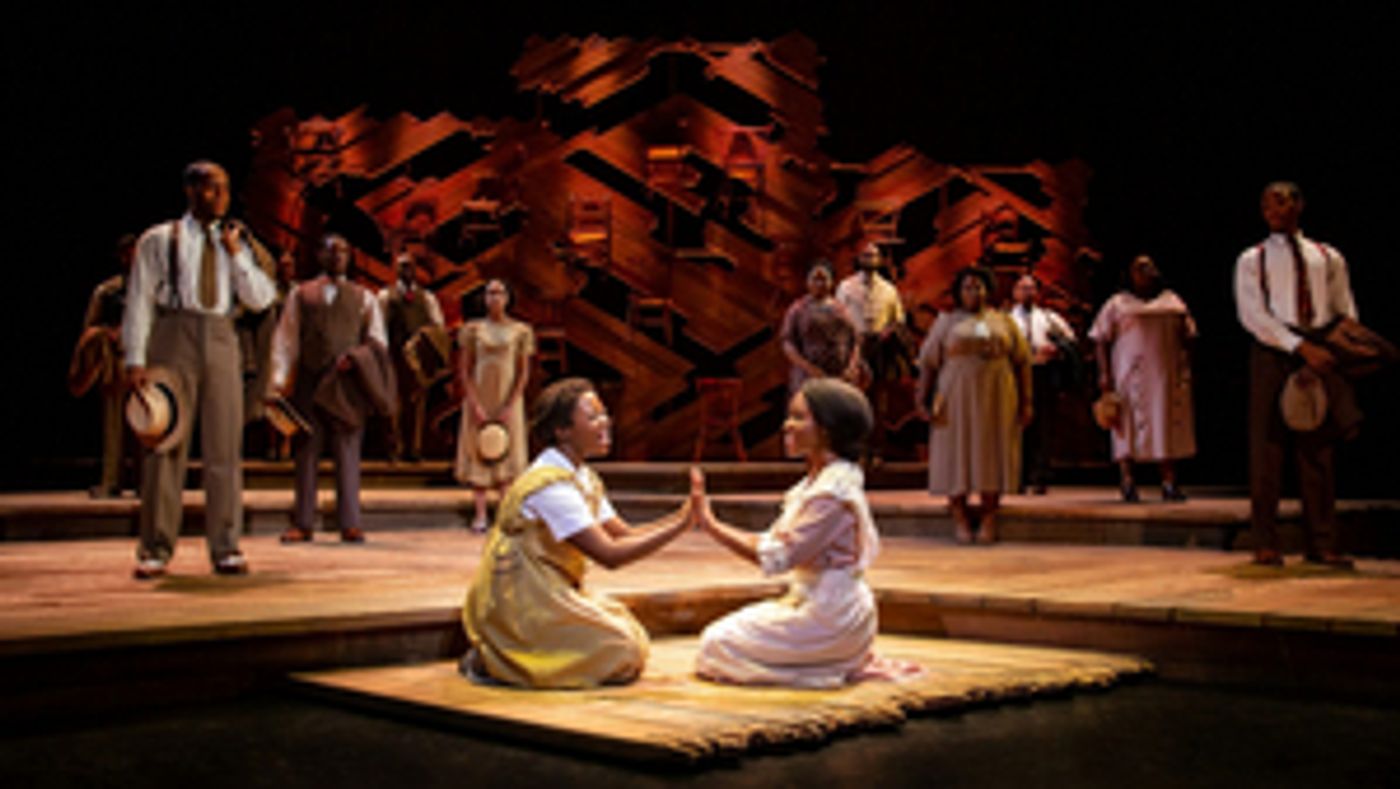Review: THE COLOR PURPLE Shines Bright at The Washington Pavilion

"I don't need you to love me, I don't need you to love. I've got...my sister, I can feel her now. She may not be here, but she's still mine." So begins the profound anthem "I'm Here", sung by Celie in the second act of The Color Purple, now playing at the Washington Pavilion in Sioux Falls, SD. That one lyric sums up a lifetime of despair and pain while at the hands of the hard-hearted and merciless men she was forced to endure over the course of her life. In the end, Celie triumphs, but not without a long, emotional journey as she struggles to find her "beautiful" self.
Based on the Pulitzer Prize winning novel by Alice Walker and the 1985 motion picture, produced by Oprah Winfrey, The Color Purple features a book by Marsha Norman, with music and lyrics by Brenda Russell, Allee Williams and Stephen Bray, and musical direction and staging by John Doyle. The story follows the life of Celie, played by Mariah Lyttle, who we first meet as an uneducated 14 year old girl in the early 1900's. Celie's life is fraught with hard-ship and heartache, as everyone she cherishes is taken from her. First her babies are ripped from her arms by her evil and incestuous stepfather and then her precious sister Nettie, played by Nashka Desrosiers, is forced to abandon her by her physically and verbally abusive husband.
Celie and Nettie are found center stage at the opening of the show, singing and clapping out "Huckleberry Pie" and their deep bond is apparent from the moment their voices combine in sweet sister harmony. The action moves quickly and the songs keep coming with the powerful chorus leading the way. Soon, we find Celie in the throws of a painful labor as she delivers her second child and sings "Somebody Gonna Love You" to the baby girl who is immediately taken from her. Lyttle's voice is exceptional and compelling and she envelops the role of Celie like she's known her forever. To watch her develop the character and grow right along with her was remarkable. Her overbearing and iron-fisted husband Mister, played expertly by Andrew Malone, is a striking contrast to Celie's tender heart. He is indeed a brutal and evil man who seems to take great pleasure in making her life a living hell. Malone is more than convincing in this role, with a big voice, a big whip and a larger than life stage presence, especially in his opening song "Big Dog", a call and response number featuring the men's chorus and some expertly handled chairs doubling as farm equipment. His children, his chores (and his bed) take over Celie's life and her path of misery continues. Mister's blundering son Harpo, Brandon A. Wright, announces that he intends to marry the brazen and outspoken Sophia, played by Chedra Arielle. When Sophia discovers that Harpo's father instructed him to beat her to tame her spirited ways, she turns the tables and strikes back with a resounding "Hell No!" a rousing "I'm mad as hell and I'm not gonna take it" song that sets Harpo (and anyone else thinking about doing her wrong) straight.
Midway through the first act, we meet the drunken and flamboyant singer , Shug Avery, played so beautifully by Sandie Lee. She is Mister's one true love and Celie soon understands why. Her tough exterior hides a heart of gold, especially in her touching rendition of "Too Beautiful for Words", her juke joint romp and stomp song "Push da Button" and her duet with Cecie, "What About Love" at the end of the first act.
The second act is a contrast to the first, in tone, message and color. The opening number "African Homeland" sung by Nettie and Celie gives us a glimpse into Nettie's life thus far while colorful African banners billow over her head . "Miss Celie's Pants" is a ray of sunshine, harmonies and rainbow hues as the woman in the cast celebrate Celie's new business venture. But the pivotal moment in act two is Lyttle's brilliant performance of "I'm Here". Her voice soars in all the right places and had the audience in tears by the end. Other highlights and standouts of the performance came from the church ladies, played by Elizabeth Adabale, Parris Lewis and Shelby A. Sykes, providing the musical narrative in almost a Greek chorus/Pickalittle Ladies sort of way, with spot on harmonies and lyrics that brought the much needed comedy and laughter at just the right moments. Gabriella Rodriguez was simply delightful as Squeak, Harpo's other love interest and another strong willed woman who finds her voice.
The set and staging were as equally compelling as the story. Simplistic and symbolic in its design, the austerity was powerful and yet the use of various wooden chairs hanging on the back wall to transform each scene and song spoke volumes, proving once again that so often, less is more.
But in the end, it's Celie's transition from a scared and insecure young girl to a strong and fearless woman that resonated most with the audience. Her remarkable transformation is a testament to the strength and resiliency that can happen when you rise up and overcome the demons and oppressors holding you back and find the strength to regain your truth. As she sings at the closing of "I'm Here"... " most of all I'm thankful for lovin who I really am. I'm beautiful. Yes, I'm beautiful. And I'm here." And for that, Miss Celie, an appreciative audience is very thankful too!
With a remarkable cast, a timeless and thought provoking story and an outstanding score, The Color Purple's final performance at the Washington Pavilion, Wednesday, January 15, should not be missed Do your soul a favor and visit www.washingtonpavilion.org for tickets.
Reader Reviews
Videos

